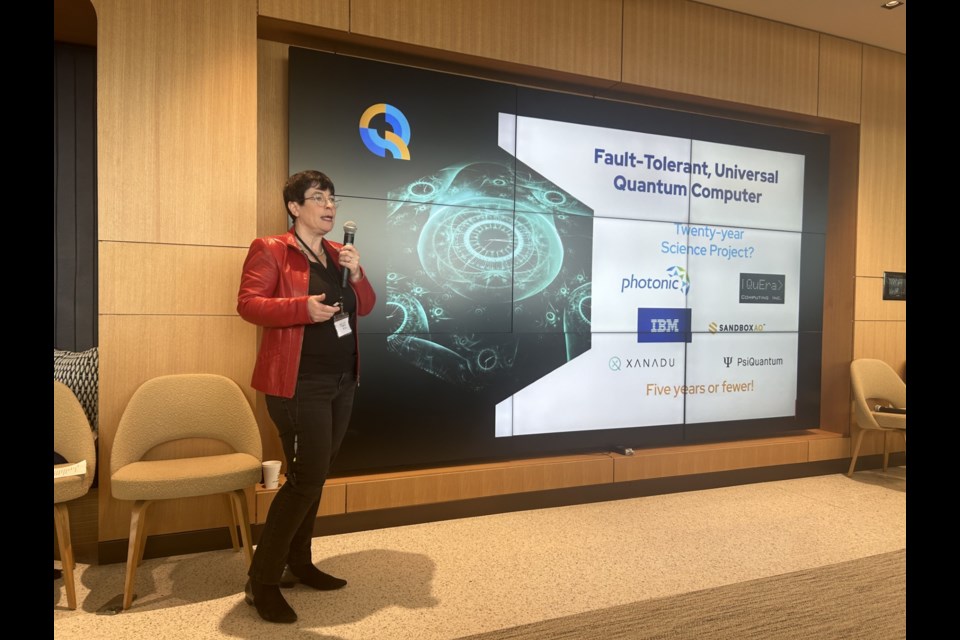Businesses must start preparing for a drastic leap in sophisticated cyber threats as quantum computing becomes more pervasive.
That’s according to experts appearing at the Count Down to Q-Day panel discussion Wednesday (Oct. 23) in downtown Vancouver.
"Whatever we create today will be decryptable in the future, and that starts now," Michael Cavallin, cybersecurity manager for British Columbia Investment Management Corp., said during the event.
Although quantum computing will enable innovation, it also has the potential to bring equal cybersecurity threats to businesses and governments.
Among the biggest concerns is cryptography, as those with access to this technology could potentially easily decrypt confidential code from conventional computers.
This poses financial and confidentiality risks for businesses of all sizes, plus threats to nuclear codes and national security data, said Cavallin, who urged organizations to consider potential data exposure consequences and prepare.
He also warned about supercharging AI with quantum computing, noting attackers can already successfully impersonate others. Cavallin cited phishing emails targeting companies, where scammers use specific style guides and mimic organizational language.
Melanie Andreson, information assurance director general for the Canadian Centre for Cyber Security, also highlighted the decryption issue.
She said “Q-Day” — the potential moment when quantum computers could break all conventional encryption safeguards — could arrive by the 2030s.
"We know based on math families of existing encryption we use, that a sufficiently powerful quantum computer will break the encryption that underpins literally everything we do on the internet today," Anderson said.
"Information you think is private today, if it needs to be private for the next 10 years, your risk is now."
While traditional computers use two bits — ones and zeros — to make calculations, quantum computers rely on qubits.
A qubit is capable of superposition — being a one and zero simultaneously. This allows it to calculate all possible values in a single operation and enable previously impossible computations.
How do businesses protect themselves from quantum computers?
Anderson says while concerning, it's not time to panic, but planning is essential.
Post-quantum cryptography, or quantum-safe cryptography, creates cryptographic algorithms invulnerable to quantum computers that run on existing hardware networks.
"Strong, secure cryptographic standards are the foundation of good cyber defence," Anderson said. "We expect certified products to be released in 2025-26 and that's when we advise people to start the transition."
In 2016, the National Institute of Standards and Technology issued a call for new encryption algorithms to withstand quantum computer attacks.
Eighty-two algorithms from 25 countries were submitted, evaluated and narrowed down, with the first three standards finalized Aug. 13, 2024.
These are ML-KEM for key establishment, ML-DSA for digital signatures and SLH-DSA for special purpose digital signatures.
By 2040, quantum computing is projected to be a US$131-billion industry, with the first commercially viable fault-tolerant quantum computer expected by 2029, according to Quantum Algorithms Institute CEO Louise Turner.
Asked for business recommendations, Turner said it depends on circumstances.
For small businesses holding substantial financial information, or larger companies and accounting firms, Turner said planning should start now.
"If you're talking to a corner store, maybe they don't need to do anything yet," she added.
Anderson said smaller organizations using Microsoft 365 as their primary software suite might receive quantum protection through software updates.
However, organizations with vital data requiring 10-year protection should consider impacts now, Anderson said.
The Quantum Computing Industry
Currently, there are 27 quantum initiatives worldwide, and countries behind these initiatives have invested US$42 billion. The private sector has also invested US$8.5 billion to drive commercialization, according to Turner.
In 2015, there were 42 quantum companies worldwide, with that number surging to 261 in 2024.
Applications range from materials to pharmaceuticals.
"Early quantum computers will not have enormous amounts of data, but they can do enormous computation," Turner said. "If you have a combinatorial problem where you've got a small number of data points to enter and then a massive space to work on, those are going to be ideal for quantum computing."
One application could be in medicine, discovering new drugs and better understanding existing diseases.
Conventional computers can only model small molecules before running out of computing power. However, quantum computers would allow modelling of larger molecules like insulin, giving doctors a better chance at curing and managing diabetes more efficiently, Turner said.
Finding new materials that are lighter, more flexible, cheaper and easier to transport would become possible, as well as understanding chemical processes like nitrogen fixation to improve agricultural yields.
According to MIT Technology Review, companies like Volkswagen AG and Daimler Motors Corp. are using quantum computers to simulate electric-vehicle battery composition to improve performance. Airbus SE is calculating the most fuel-efficient ascent and descent paths for aircraft.
Quantum computing could especially benefit artificial intelligence, machine learning and language models.
Turner says quantum computers will drive these areas because of quick calculation capacity and lower energy usage.
"By the same token, AI and machine learning models will then help improve how we use quantum computers," Turner said. "The way we program things, the way we transition from classical algorithms to quantum algorithms."
This technology currently sits on export control lists alongside nuclear weapons for the U.S. and Canadian governments.



